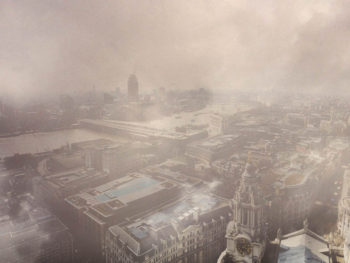A state of emergency: How the UK should tackle transport emissions
Hard-hitting actions from eco environmental activists over the last month are ensuring progress is being made on upping the climate change ante. Natalie Middleton asks the environmental specialists how exactly we should tackle the UK’s stubbornly high road transport emissions.

Tax reform is essential including bringing forward the 2% BiK rate; and a rebate on ZEVs paid for by a tax on gas guzzlers.
It’s been some 30 years in the making but there’s finally been some headway made when it comes to recognition of the fact that unless we stop carbon emissions, we are threatening the survival of the next generation.
The actions of Extinction Rebellion – described by one of the founders, Roger Hallam, to The Guardian as the “biggest organised civil disobedience campaign in British history” – and Swedish teen activist Greta Thunberg have ensured that climate change is not only back on the front pages, it’s also on the political agenda, with the UK Parliament now having responded to calls and declared an ‘environment and climate emergency’.
It’s pertinent timing; although the Climate Change Act commits the UK government by law to reducing greenhouse gas emissions by at least 80% of 1990 levels by 2050, the Committee on Climate Change (CCC) has just published a report recommending the UK strengthens the cut to net zero emissions.
But what can be done about transport which, according to the DfT’s Transport Statistics Great Britain 2018, is now the largest contributor of greenhouse gas emissions in the UK after noticeable declines in emissions from the energy sector. In fact, emissions from transport have barely fallen since 1990.
In the spirit of Extinction Rebellion’s three main demands on climate change to the UK government – and in recognition of Greta Thunberg’s strict no-fly policy and the growing wave of ‘flight shame’ in her home country – what three immediate actions should the Government take on transport emissions?
The CCC has said in its Net Zero report that the current government target of ending the sale of new conventional petrol and diesel cars and vans by 2040 – reiterated in last year’s Road to Zero Strategy – is too late and current plans for delivering this are too vague; it’s calling instead for the timeline to be moved forwards to 2030, focused on pure electric cars and backed up by developments in charging infrastructure.
But the report from the Government’s climate change advisers also sets out three ways for individuals and households to take action on the way they travel; from a switch to walking/ cycling/public transport, to opting for an electric car and charging it smartly, and also – in line with ‘flight shame’ – to minimise flying, especially long-haul.
ClientEarth, which has won three legal cases against the UK government over illegal levels of air pollution across the country – and provided support for the new CCC Net Zero report, agrees that the goal of phasing out petrol and diesel cars and vans should be brought forward to 2030 but the firm’s Andrea Lee, campaigns and policy manager, clean air, also says there are three steps that should be taken today.
First, the Government should introduce a national network of Clean Air Zones (CAZs) that can quickly remove the most polluting vehicles from the most polluted parts of our towns and cities. CAZs should be backed up with help and support for people and businesses, in particular people on low incomes and small businesses.
Secondly, the UK Government should make cleaner vehicles more affordable and accessible now. Retrofit and upgrade solutions could also be a useful intermediate step. It should make the motor industry contribute to this, given its role in “producing diesel cars that were not as clean on our roads as people were led to believe”.
Targeted diesel scrappage schemes could help people and businesses use less polluting hybrid or electric vehicles, including e-bikes, free public transport season tickets or subsidised car club membership, for example.
And thirdly, there should be investment in public transport, walking and cycling infrastructure.
Meanwhile Greg Archer, UK director of lobby group Transport & Environment – which also provided support to the Net Zero report, agrees with the CCC recommendation on 2050 net zero emissions, but also says stronger policies will need to accompany the target in order to drive radical changes to our cars and how we use them.
He outlines: “Firstly, the Treasury needs to continue to support the shift to zero-emissions vehicles. The last car with an engine needs to be sold in the early 2030s, but electric car grants are under threat just as new models are launched. Tax reform is essential including bringing forward the 2% BiK rate; and a rebate on ZEVs paid for by a registration tax on gas guzzlers.
“Secondly, we need to encourage a shift away from car ownership in cities and encourage new mobility services by adapting Finland’s new digital transport services law. But alternatives to car use must also be made more attractive by investing in regional rail and dedicating road space for bus lanes and cycle paths.
“Thirdly, road pricing needs to be put back on the agenda. The marginal costs of car use are far too low to encourage responsible car use. Charges could be adjusted by the levels of congestion, vehicle emissions and car occupancy, thus tackling both the environmental and congestion costs of transport. It will be essential once driverless electric cars are the norm.”

















